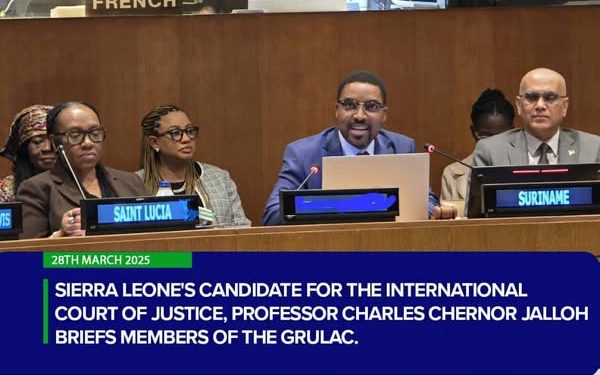Freetown, September (SLENA) – The Government of Sierra Leone has formally endorsed Professor Dr. Charles C. Jalloh for election to the International Court of Justice (ICJ) for the 2025–2027 term, citing his extensive expertise in international law and his distinguished record of service to the global legal community.
The endorsement was announced on August 29, 2025, during a meeting at the Ministry of Foreign Affairs and International Cooperation, attended by High Commissioners, Ambassadors, and members of the Diplomatic and Consular Corps. Director General Mr. Alan C. E. Logan reaffirmed Sierra Leone’s commitment to a rules-based international order and underscored the ICJ’s central role in upholding the UN Charter and the rule of law.
Mr. Logan described Prof. Jalloh as an eminent scholar and practitioner with wide-ranging expertise in civil and international law, whose practical experience equips him to make meaningful contributions to the Court and the international community.
In declaring his candidacy, Prof. Jalloh appealed for the support of all UN member states ahead of the November 2025 election at the United Nations Headquarters in New York. He stressed the ICJ’s vital role as the UN’s principal judicial organ in safeguarding peace and justice through law.
Highlighting the Court’s growing relevance, Prof. Jalloh noted that the ICJ is currently handling 27 active cases—the highest number in its history—reflecting the increasing reliance on international law as a peaceful means of dispute resolution.
He further emphasized the ICJ’s dual mandate: adjudicating disputes between states and issuing advisory opinions when requested by UN organs or specialized agencies. Prof. Jalloh underscored the importance of maintaining judicial rigor, independence, and impartiality, especially in the face of political pressures and rising skepticism toward some international institutions.
Outlining his vision, Prof. Jalloh pledged to uphold three guiding principles—Integrity, Independence, and Impartiality. He explained: “Judging is about understanding and respecting the arguments of all parties, even those with whom one might initially disagree. It requires being open to persuasion, grounded in law, and guided only by justice.”
Prof. Jalloh drew attention to the significance of the ICJ for Africa, noting that African states are among the Court’s most active users, with approximately 72% of its cases originating from the continent. He stressed that “for formerly colonized states, the rule of international law remains vital to ensuring justice and fairness in global governance.” Prof. Jalloh concluded by expressing deep honor at Sierra Leone’s nomination and reaffirmed his readiness to serve as an independent and impartial judge of the ICJ, should the global community entrust him with this responsibility
With over 21 years of experience as a legal adviser, professor of international law, and two-term member of the UN International Law Commission (ILC), Prof. Jalloh brings unparalleled expertise. At the ILC, he contributed to the progressive development and codification of international law as one of 34 independent experts elected globally.
Minister of Foreign Affairs and International Cooperation, Alhaji Timothy Musa Kabba, described Prof. Jalloh as a leading international law scholar and practitioner, nominated by Sierra Leone’s National Group for election to the ICJ. He reaffirmed Sierra Leone’s steadfast commitment to the ICJ’s mission as the UN’s highest judicial body.
President Julius Maada Bio also publicly endorsed Prof. Jalloh, commending his service to international law and Africa’s advancement. The President highlighted Prof. Jalloh’s extensive pro bono work for African governments and regional organizations, including the African Union, as well as his appearances before domestic and international tribunals such as the Special Court for Sierra Leone, the International Criminal Court, the International Tribunal for the Law of the Sea (ITLOS), and the ICJ. Notably, he has represented Sierra Leone and other African states in ICJ and ITLOS proceedings on climate change.













